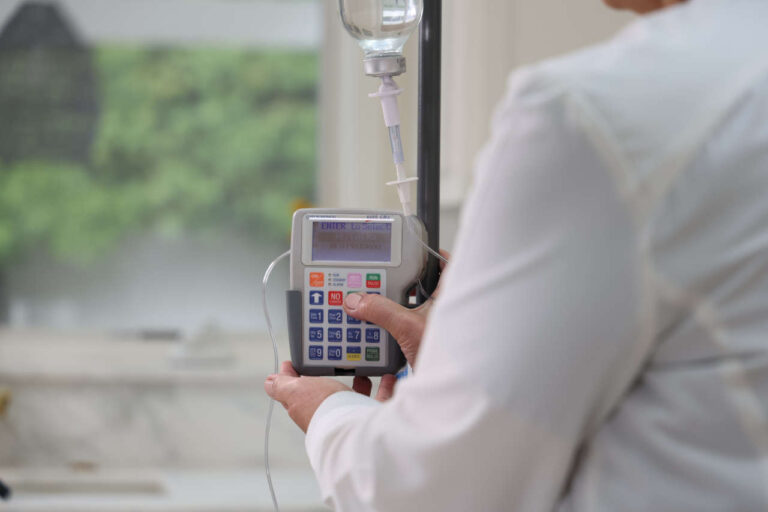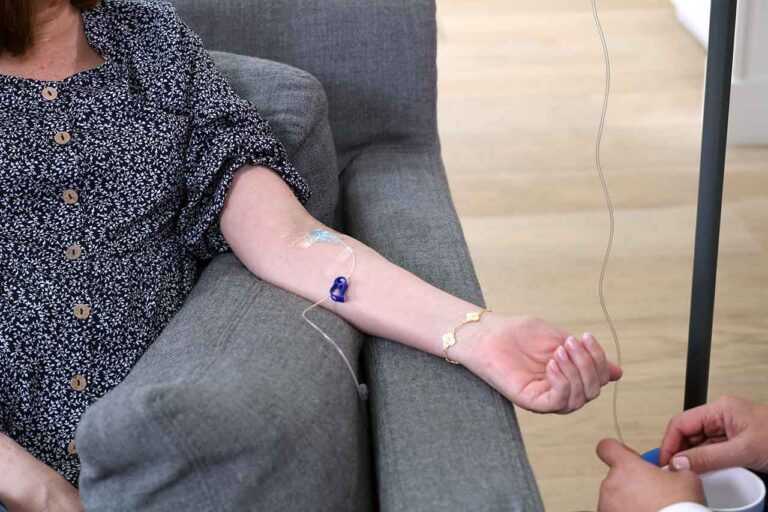
IVIG is used as a supportive therapy in patients with multiple myeloma. Multiple myeloma is a rare type of blood cancer that forms in plasma cells, a type of white blood cell that produces antibodies to fight infections under normal conditions.
Kumuha ng IVIG Copay Assistance
In patients with multiple myeloma, the cancerous plasma cells do not produce effective antibodies, leaving them more vulnerable to infections. According to research, recurrent infections are one of the underlying causes of death in 22% to 45% of patients with multiple myeloma.
Doctors typically recommend IVIG therapy to reduce mortality and morbidity rates in multiple myeloma patients.
Let’s review the basics of multiple myeloma, including its effects on the immune system, as well as how IVIG therapy can help patients suffering from multiple myeloma.
Basics of Multiple Myeloma and How It Affects the Immune System
Multiple myeloma is a cancer that arises from the bone marrow and affects plasma cells. It is also known as “cancer of plasma cells,” where a single plasma cell becomes cancerous, multiplies nonstop, and builds up in the bone marrow. Eventually, the cancerous plasma cells (also known as myeloma cells) crowd out the healthy blood-forming cells in the bone marrow.
Furthermore, cancerous plasma cells produce abnormal, ineffective antibodies called M proteins that can’t fight infections.
Additionally, myeloma treatments like chemotherapy and stem cell transplants weaken the patient’s immune system. These therapies not only kill the cancerous cells but also destroy the healthy cells, leading to low healthy plasma cell counts and antibody levels. As a result, patients with multiple myeloma become highly susceptible to infections such as pneumonia (respiratory infection).
What Is the Prevalence of Multiple Myeloma in the US?
According to American Cancer Society estimates, over 35,000 new cases of multiple myeloma and around 12,540 deaths are expected to occur in 2024.
Multiple myeloma is more common in older people, with an average age of 65 – 69 years old.
How Can IVIG Therapy Help Multiple Myeloma Patients?
IVIG therapy has been used for decades to treat various immune-related conditions, including multiple myeloma.
In multiple myeloma, IVIG therapy temporarily supplies patients with an array of antibodies and helps to improve their overall immune functions. These antibodies recognize and fight off infections that the patient’s own immune system is too compromised to handle.
How Does IVIG Therapy Work?

Although the exact mode of action of IVIG therapy is unknown, according to studies, it boosts the immune response against infections. In multiple myeloma patients, IVIG can exert the following beneficial effects:
It Reduces the Frequency of Recurrent Infections
IVIG therapy strengthens the patient’s immune system by providing antibodies. Various studies indicate that IVIG therapy can help reduce the frequency of recurrent infections, including grade 3 infections, in patients with multiple myeloma.
For example, a study published in ”Blood Cancer Discovery” reported that intravenous immunoglobulin therapy can reduce the risk of grade 3 and grade 5 infections by 90% in patients with relapsed or refractory multiple myeloma. Researchers further concluded that IVIG therapy should be given throughout treatment as well as after treatment.
Ask About IVIG Home Infusion
It Provides Passive Immunity
IVIG provides passive immunity to MM patients, which means ready-made antibodies obtained from donors are infused into the body of an MM patient to fight infections. Unlike vaccines that stimulate the plasma cells to produce antibodies, IVIG therapy supplements the patient’s body with essential antibodies that provide immediate protection and work against infections.
It Exerts Anti-Cancer and Anti-Inflammatory Effects
IVIG is known for its anti-inflammatory properties, which help to regulate the overactive immune system in various autoimmune disorders.
Recent research at the MD Anderson Cancer Center revealed that IVIG therapy decreased the growth of myeloma cells (cancerous plasma cells) and caused cell death. Based on these findings, the researcher concluded that IVIG therapy may induce anti-cancer effects and that adding it to standard myeloma treatment could help obtain better outcomes.
What Is the Standard Dose of IVIG for Multiple Myeloma Patients?
IVIG is typically given to myeloma patients every 3 to 4 weeks at a dosage of 0.4 grams per kilogram. The frequency of IVIG administration may differ depending on the person’s steady-state immunoglobulin levels.
For example, some patients may require IVIG therapy once a month, while others may need it more frequently.
Who Can Benefit From IVIG Therapy?
Multiple myeloma patients who have hypogammaglobulinemia (low level of antibodies in their blood) and are highly susceptible to recurrent or severe infections can benefit from IVIG therapy.
Similarly, MM patients who are undergoing chemotherapy and stem cell transplants can also get benefits from IVIG therapy, as these intensive treatments affect the immune system and increase the risk of infections.
For example, a cohort study demonstrated that using IVIG during immune-based therapies significantly reduces all-grade infections by 40%.
It is important to note that IVIG therapy is not a stand-alone treatment for multiple myeloma. Rather it is used as a supportive therapy to reduce the risk of infections in multiple myeloma patients.
MGA SANGGUNIAN:
- Lancman, G., Lozada, K., Athar, N., Jacobs, S., Doucette, J., Cho, H. J., Jagannath, S., Madduri, D., Parekh, S., Richard, S., Richter, J., & Chari, A. (2021). Efficacy of Intravenous Immunoglobulin for Preventing Infections in Patients with Multiple Myeloma. Clinical Lymphoma Myeloma and Leukemia, 21(5), e470-e476. https://doi.org/10.1016/j.clml.2020.12.026
- Jones, R. J., Singh, R. K., Shirazi, F., Wan, J., Wang, H., Wang, X., Ha, M. J., Baljevic, M., Kuiatse, I., Davis, R. E., & Orlowski, R. Z. (2020). Intravenous Immunoglobulin G Suppresses Heat Shock Protein (HSP)-70 Expression and Enhances the Activity of HSP90 and Proteasome Inhibitors. Frontiers in Immunology, 11, 555935. https://doi.org/10.3389/fimmu.2020.01816
- Lim, K. J. C., & Quach, H. (2023). The role of intravenous immunoglobulin (IVIG) in reducing infection risk in multiple myeloma (MM) patients receiving Immune-Based Therapies: a Single Center experience. Blood, 142(Supplement 1), 6671. https://doi.org/10.1182/blood-2023-173893
- Lim, K. J. C., & Quach, H. (2023). The Role of Intravenous Immunoglobulin (IVIG) in Reducing Infection Risk in Multiple Myeloma (MM) Patients Receiving Immune-Based Therapies: A Single Center Experience. Blood, 142, 6671. https://doi.org/10.1182/blood-2023-173893
- Chapel, H., Lee, M., Hargreaves, R., Pamphilon, D., Prentice, A., Chapel, H., Hargreaves, R., Lee, M., Pamphilon, D., & Prentice, A. (1994). Randomised trial of intravenous immunoglobulin as prophylaxis against infection in plateau-phase multiple myeloma. The Lancet, 343(8905), 1059-1063. https://doi.org/10.1016/S0140-6736(94)90180-5
- Lancman, G., Sastow, D., Aslanova, M., Moshier, E., Cho, H. J., Jagannath, S., Madduri, D., Parekh, S., Richard, S., Richter, J., Sanchez, L., & Chari, A. (2020). Effect of Intravenous Immunoglobulin on Infections in Multiple Myeloma (MM) Patients Receiving Daratumumab. Blood, 136, 6-7. https://doi.org/10.1182/blood-2020-140056













